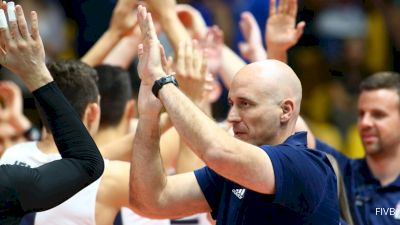Libero Erik Shoji is Team USA's Backbone
Libero Erik Shoji is Team USA's Backbone
USA's de facto backbone is libero Erik Shoji, the defensive ace who has started more matches than any other U.S. player in the tournament.

You could point to several pivotal moments so far that have defined the U.S. Men’s National Team’s experience in the 2018 Volleyball Nations League tournament.
There was the dramatic come-from-behind victory over Argentina in the VNL opener on May 25, a five-set classic that the Americans survived despite facing match point in the third set. Then just a week after that, on June 1 in Goiânia, Brazil, Team USA mounted a similar comeback against Japan, rallying from a 0-2 hole led by heroic efforts from four substitutes.
Cohesiveness and depth was carrying the squad in the tournament’s early going, and yet both would take a hit before the prelim round was complete.
There was no such five-set luck against Brazil on June 3, as the U.S. took their first loss despite holding three match points. Then, an ugly defeat to Germany in the next match— which U.S. head coach John Speraw called “maybe the worst match” his team has played during his five years at the helm— on June 8 in Ottawa, Canada, laid the groundwork for the next day’s come-to-Jesus moment against Australia, as Speraw’s now-famous tongue-lashing served as the wake-up call the team desperately needed.
The Americans rattled off five straight wins from there, but not before outside hitter Thomas Jaeschke went down with a gruesome knee injury against Serbia on June 15. A ruptured ACL ended his then promising season, a shot to the U.S. depth and an emotional hurdle to clear for the entire group.
Despite an up-and-down journey through the Nations League prelim round, the team finished in third place, and now arrives in the Lille, France, for the final round well-positioned to make a run at gold.
There for it all has been the national team’s de facto backbone, libero Erik Shoji, the defensive ace who has started more matches than any other U.S. player in the tournament.
The 28-year-old Olympian— a six-year veteran of the national team— has been his usual steady self over the course of 15 tiresome matches in under a month, the anchor in the back row who ranks in the tournament’s top-10 in both digs and receiving. Without Shoji’s familiar presence, the Americans very well could have missed a trip to the finals entirely.
“I think we’ve just been fighting really well, and competing really hard which is definitely a strength of ours. Definitely our block and our defense has improved over the tournament. I think that’s a strength of ours right now,” said Shoji.
“Moving forward, it’s all about serving and passing for us. It’s definitely something we’re always looking to improve. If we can do that, I think we have a good chance at a medal and gold medal as well.”
Shoji may not garner attention like U.S. star opposite Matt Anderson, the team’s top scorer, but his steadying role in passing and serve receive has been just as crucial for a team that has had issues in those departments at times.
In losses, the Americans— a blend of Olympians and newcomers still working to gain cohesiveness— have given their opponents way too many points on errors, but Shoji’s place among the top-10 passers in the tournament has been instrumental in setting the team up for success. HIs 16.5 percent receiving efficiency is ninth-best in the Nations League, and second among players in the finals.
In a tournament that started before Memorial Day and will end after Independence Day, the format hasn’t always made showing up to play each day at a high level easy. But Shoji hasn’t wavered.
“I’m having fun out there. This tournament was a grind, but we’re finding our rhythm, finding our groove, and it’s really fun to be out there,” he said.
That’s not to say Shoji won’t look to be even better in the finals, July 4 -8. The top libero from the 2015 FIVB World Cup and a standout on the 2016 Olympic bronze-medal squad, Shoji gauges his performance on the team’s ability to avoid aces and pass well. Allowing 12 aces like Team USA did against Germany and committing 44 errors like they did versus France won’t fly in the finals, so Shoji wants more.
“How well we do against tough servers, how many times we get aced, how well we’re fighting off these really tough serves. I definitely look at different things, it’s not always about the statistics. How well the team did overall in these different aspects of the game,” he said.
Of course, as a national team veteran who has been on the court more than anyone else, Shoji’s role extends beyond what he does with his arms and legs. Communication and leadership may not fill a stat sheet, but for a team that was missing much of its core at the beginning of the tournament as top players returned from club volleyball, Shoji’s experience has been invaluable. It’s an area he says has improved substantially since his first season in the U.S. gym back in 2013.
“One thing is definitely communication,” Shoji said. “Being more comfortable with the guys and just being comfortable that I have to be a vocal leader out there when it comes to reception and defense and kind of being the leader of the back court.”
Team USA will be counting on Shoji’s physical presence and intangibles as they kick off finals play on Thursday against Poland in Pool B.